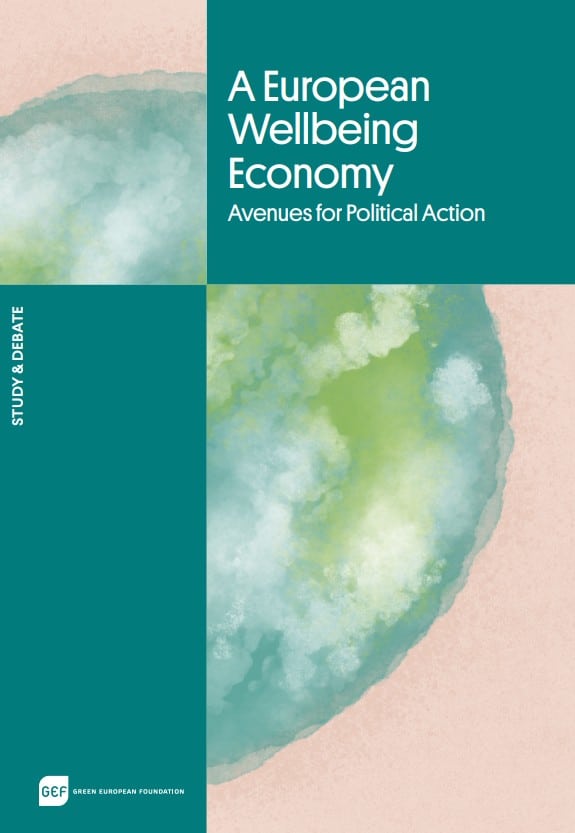The EU is rethinking what economic success looks like. With GDP failing to reflect social and environmental wellbeing, there are calls to build a wellbeing economy model, one that prioritises people and the planet. Antoine Oger, Interim Executive Director, Research Director, from the Institute for European Environmental Policy and Taube Van Melkebeke, Head of Policy from the Green European Foundation, explores this shift.
The Treaty of the European Union sets out that “the Union’s aim is to promote peace, its values and the well-being of its peoples”. In recent years, the EU has undertaken significant steps towards a just and green transition, notably through the European Green Deal (EGD). Yet, the ongoing triple planetary crisis of climate change, biodiversity loss, and pollution demands more, faster, and deeper action to bring the EU economy back within a safe operating space and in line with its own treaty.
The scale of the sustainability challenge is clear, especially amid geopolitical tensions and rising political scepticism toward green legislation. While public support for climate action remains strong, it’s time for policy to balance ambition with equity to ensure societal acceptance.
For too long, economic growth and short-term profit have been used as excuses to sideline the wellbeing of people and our population. It’s a false choice, and one the EU can no longer afford to make. A just transition to a wellbeing economy isn’t just idealistic; it’s essential. Why? Because it offers a coherent path to a fairer, greener, and more resilient future in social, economic, and environmental terms.
Building a wellbeing economy that stays within Earth’s boundaries
The midterm review of the EU’s 8th Environment Action Programme reminds us that we still need to massively increase our already arguably ambitious efforts of the last decade to achieve a fair, net-zero economy by 2050. Otherwise, thematic goals such as addressing land-use change and biodiversity loss, reducing energy consumption, doubling circular material use, and decreasing our consumption footprint will not be reached.
The EGD has been a significant step in the right direction, not only in environmental ambition but in starting to shift the EU’s idea of what economic progress really looks like. By placing climate action, social fairness, and long-term resilience at the heart of economic planning, it signals a move beyond the narrow lens of the gross domestic product (GDP). But it is not enough. For all its promises, the EGD was still met with considerable political backlash, leaving us questioning whether the EU can adopt more ambitious legislation.
The wellbeing economy does offer a remedy. The transition to a wellbeing economy aims to provide a holistic political strategy that addresses the triple planetary crisis while catering for basic social needs using economic tools. When discussing wellbeing economy approaches at the EU level, we must first show that economic growth is not a necessity for achieving wellbeing within planetary boundaries. Instead, staying within these boundaries is the true prerequisite for wellbeing, with sectoral economic growth being just one potential means to get there.
Economic growth can support a wellbeing economy in certain sectors, such as clean energy, but in others, such as fossil fuel extraction and use, it becomes uneconomic and detrimental.
Despite this, the continued emphasis on the growth of GDP persists, particularly in ongoing debates raging about strengthening the EU’s global competitiveness. This prompts critical questions we need to address: growth of what, for whom, at what cost, and how long can it last? Who bears the burden, what’s the cost to the planet, and how much growth is enough?
Centring equity and a just transition
The EU must embrace ambitious environmental policies that are grounded in justice, not only environmental but also social and fair to all. Without this, the just transition risks losing social acceptability and intergenerational fairness. The relationship between social and environmental policies, both their synergies and trade-offs, must be placed at the centre of all future policy developments.
The upcoming review of the European Pillar of Social Rights Action Plan is a key opportunity to integrate innovative, less growth-reliant approaches into the EU’s social-ecological mode. Concepts such as work-time reduction, universal basic services, and dividends should be seriously considered. Of course, this must be coupled with reforming the European Semester and other core reporting tools, such as the medium-term fiscal-structural plans (MTPs), to track progress on distributional justice more meaningfully.
Lessons can also be learned from the shortcomings of the and the national Recovery and Resilience Plans (RRPs) in terms of procedural justice. These show that future legislation and investment plans must be co-created with civil society, social partners, and communities rather than simply delivered from the top down.
Citizen participation needs to be strengthened across the EU, in line with recent European Commission guidelines based on lessons learned from existing initiatives in Member States. From citizens’ assemblies to participatory budgeting, these democratic innovations can help address the EU’s persistent democratic deficit and strengthen legitimacy in the eyes of those it serves.
Finally, the expected publication of a Strategy on Intergenerational Fairness should serve as a critical turning point, a clear commitment to ensure that EU policies reflect the interests not only of those living today, but of future generations yet to come.
Measuring what matters: indicators for a wellbeing economy
GDP is no longer fit for purpose as a standalone indicator of progress in the EU. To support the just transition, complementary indicators and metrics must be embedded into both the design and implementation of policy. The Commission’s Strategic Foresight Report 2023 took stock of the myriads of recent and ongoing initiatives to develop sound indicators for sustainable and inclusive wellbeing (SIWB). These institutional progresses now need to be formalised in the policymaking process.
The Commission’s top priority should be to champion the integration of SIWB indicators into the United Nations’ System of National Accounts (SNA), as part of the 2025 reform. This would mark a critical shift in how wellbeing and sustainability are measured within national accounting frameworks. The updates would then reflect in the revised European system of national and regional accounts (ESA) by 2029, and influence other core EU statistical tools, including the EU environmental accounts.
Embedding the Commission’s proposed headline dashboard into existing EU processes such as the European Semester, the Annual Sustainable Growth Survey, and impact assessments would ensure that wellbeing and environmental priorities are more than just rhetoric. They would become part of the everyday machinery of EU governance.
The power of prediction: policy modelling
The European Union has a wide range of models at its disposal, and these are used throughout the policy cycle. This is particularly the case for the design stage, which includes a Sustainable Impact Assessment. These models are codified in the EU’s better regulation guidelines and toolbox, and they carry significant influence in shaping policy outcomes.
Yet, the power of these models lies not only in their technical design but in the choices behind them. These include which issues are prioritised, how they are weighted, what assumptions are made, and whose perspectives are included. These are not neutral decisions. They are political and must be open to scrutiny.
Currently, many of the models used by the European Commission largely fail to encompass ecological economics concepts. They often overlook the costs of climate change or underrepresent key Sustainable Development Goals (SDGs) and fail to adequately account for the economic, social, and environmental implications of legislation.
To address this, the EU must diversify its impact assessment approach through a mix of qualitative and quantitative analysis and reduce reliance on a narrow set of inherently partial models. Reforms should include the integration of environmental and wellbeing dimensions, the use of multiple modelling approaches within a single assessment, and a more complementary use of different analytical tools.
Crucially, the Commission needs to equip itself with sufficient capacity to implement these more complex, yet necessary, procedures. EU institutions should come together to formalise these changes and renew their economic modelling toolbox by updating their Interinstitutional Agreement on Better Law-Making, now nearly a decade old. It is long overdue that the EU’s economic modelling reflects the realities of sustainable and inclusive wellbeing.
Global challenges, global solutions: the external impact of the EU
It is now well documented that the EU’s consumption pattern–and corresponding supply chains that support them–continue to generate negative spillover effects on other countries. These external impacts threaten to undermine any domestic sustainability progress achieved within EU borders.
Take the EU’s 2030 targets of a 55% reduction in greenhouse gas emissions. It fails to account for the fact that the EU’s imports represent nearly half of the bloc’s territorial emissions. While domestic environmental impacts may have decreased by 12% between 2010 and 2018, even as GDP grew by 23%, the EU’s overall consumption footprint actually rose by 4% during that same period.
In reality, the footprint is likely to be much higher. Key impacts such as biodiversity loss of resource overexploitation is often left out due to data gaps, meaning current figures underestimate the true scale of environmental harm. What we are seeing is a form of decoupling that is absolute within the EU’s borders, but only relative when viewed globally. In short, it is not enough.
The EU must consider (e.g. quantify, monitor and act upon) the global economic, social, and environmental impacts of its production and consumption patterns. This means rethinking how we design partnerships with third countries. Instead of focusing narrowly on market access, new generation EU Agreements should embed enhanced sustainable impact assessments that also consider social and environmental outcomes.
Development cooperation priorities must also shift. Official development assistance, both in terms of its levels and focus, should be leveraged to support mutually beneficial strategies that allow partner countries to pursue their own wellbeing goals within planetary boundaries.
Ultimately, the EU and its Member States should use their vast diplomatic networks to call for a global fair transition, one that supports systemic change and embeds shared responsibility across borders.
Transforming key economic forces to rethink finance and business
The macroeconomic case for transitioning to a wellbeing economy is increasingly difficult to ignore. The cost of climate-related damages far exceeds the cost of mitigation, yet financial flows remain fundamentally misaligned with the goals of shared prosperity within planetary boundaries.
Public money continues to pour into harmful activities such as fossil fuel subsidies, while investment in the green and social economy remains far too limited. Estimates suggest that €500 to €1,000 billion per year will be needed at the EU level to address the triple planetary crisis and achieve a just transition to net zero by 2050. So far, we are nowhere near that figure.
We understand there are many competing demands, such as digitalisation, competitiveness, industrial policy, or defence, but transitioning toward a wellbeing economy is arguably the most cost-effective way to build resilient societies to address these priorities collectively.
The upcoming negotiations for the post-2027 EU Multiannual Financial Framework (MFF) and the successor to the Recovery and Resilience Facility represent a rare and vital chance. These EU budget processes, peaking in 2025 and 2026, are the main window of opportunity to support the transition to a fair, sustainable, and resilient economy.
EU funding alone won’t be enough. National and international reforms will be crucial. That includes implementing taxes on wealth and fossil fuel profits, phasing out environmentally harmful subsidies, and improving tax collection. Environmental and social conditionalities should be made central across spending and procurement, ensuring that every euro spent supports positive outcomes for people and planet.
Private finance must also be part of the solution. The EU and Member States should enable a shift away from short-term financial interest and growth demand by supporting the transformation of financial institutions and businesses into social economy entities. Strengthening the EU’s sustainable finance and business frameworks will be crucial, not only to curb destructive economic activities but to boost the competitiveness of businesses that will eventually thrive in a net-zero economy.
In the face of crisis, the EU has the power to shape a sustainable future
Advancing the political recommendations outlined in this article offers EU policymakers, in service of its people, a clearer understanding of ends and means within a wellbeing economy. It begins with recognising that the EU economy is not separate from society or nature; it is embedded within cultural and social systems, which themselves exist as a sub-system of Earth’s biosphere.
In the face of the triple planetary crises, hope lies in humanity’s creative capacity, our collective ability to rethink, redesign, and improve. Decades of progress in both natural and social sciences have provided us with the knowledge and tools to pursue shared prosperity within planetary boundaries.
The EU has a powerful role to play in shaping the trajectory of these interconnected socioecological systems. But this is not a task it can take alone. It is, by definition, a global endeavour, and one that must be rooted in solidarity, responsibility, and the courage to lead.



